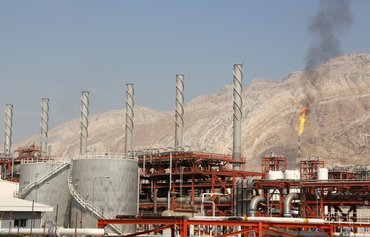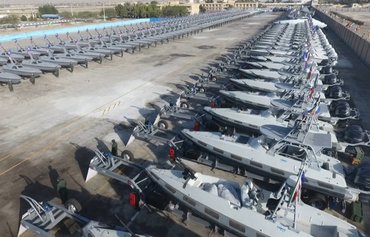The details of a new strategic partnership agreement between Iran and China have yet to be made public, but it has already created a great deal of controversy in Iran.
Last year, Iran's Foreign Minister Mohammad Javad Zarif visited Chinese Foreign Minister Wang Yi to present a road map for the 25-year agreement, first proposed in 2016.
President Hassan Rouhani's cabinet approved it in June of this year, but it has not yet been submitted to Iran's Parliament for approval or made public.
The "staggered 25-year deal could mark seismic shift in the global hydrocarbons sector", Petroleum Economist reported in September 2019.
The publication quoted Iranian sources as saying the pillar of the agreement is China's $280 billion investment in Iran's oil, gas and petrochemical industries.
China will invest another $120 billion to upgrade Iran's transport and manufacturing infrastructure, in line with China's Belt and Road Initiative, the report said.
China intends to utilise the low cost labour available in Iran to build factories, designed and overseen by large Chinese manufacturing companies.
While the benefits to both countries are presented as plentiful, China is taking a huge risk investing in Iran, which has been the target of US sanctions in a number of industries, observers say.
Major Chinese company sanctioned
Already, two units of China's largest transportation network, COSCO, were sanctioned by the US last September as a result of their complicity in circumventing sanctions on Iran.
COSCO owns about 4% of all existing super oil-tankers globally.
The embargo on COSCO immediately caused an increase in the price of oil shipments in Asia and increased overall costs by about 30%.
It reached the point where Chinese government officials demanded sanctions be lifted from the company during trade negotiations with the US in January. Sanctions eventually were lifted on one of the two units.
It is worth noting that COSCO's 2019 profits were 28 times more than the amount Iran hopes China would invest in it -- some $400 billion -- within the framework of the agreement, Iran-based economic Moloud Zahedi told Al-Mashareq.
It now seems highly unlikely that China would give up its largest export market, the US, by investing excessively in Iran, Zahedi said.
China exports hundreds of billions of dollars worth of goods and services to the US each year, she said. If the US imposes sanctions on Chinese companies or citizens over their Iran-related activities, China will lose significant segments of its global markets, which are estimated to yield several times the potential profit of investment in Iran.
After the US imposed unilateral sanctions on the Islamic Republic in 2017, China withdrew from the 11th phase of the South Pars oil field development plan.
China was not alone; the French company Total also left the French-Chinese consortium for co-operation in the South Pars oil field, which shows that the ripple effect from these sanctions extends well beyond Iran and has already reached China and some European countries.
Iranian public angered by China's presence
Due to the US's "maximum pressure" campaign and the lack of imported raw material for production, Iranian manufacturing has totally ceased since 2017. Iranian markets are instead saturated with imported Chinese goods.
Fariborz Etemad, an Iran-based economist, referred to Iranians' widespread dissatisfaction with low quality Chinese goods in the country, which led to some Iranians launching a campaign against buying Chinese products in the past two years.
A large section of the Iranian public is against Chinese presence on Iran's economic scene, he told Al-Mashareq.
"While the continued saturation of Iranian markets with Chinese goods would create a safe margin for the Iranian government, it would also further increase the Iranian public's dissatisfaction with China," he said.
"The inability of the Islamic Republic's leaders to secure the needs of the Iranian public is so profound that China's presence cannot compensate for it," he said.
Meanwhile, China's trade relations with Saudi Arabia should also be taken into consideration, Etemad said.
"Due to its growing need for imported oil, China has sought to establish a solid foothold in Saudi Arabia in recent years," he said. "It deals with Saudi Arabia and Iran, who are regional rivals, in a way that upsets neither. This is done through a policy of pleasing both sides."
However, "if the so-called agreement [between China and Iran] is implemented, China would have to give up its Saudi oil, which may not be in its benefit", he said.
China not likely to pick Iran over US
Following the announcement of the agreement, IRGC-affiliated media launched a massive propaganda campaign on China's economic presence in Iran, describing it as the "New Silk Road".
The campaign seems to indicate to the Chinese that there is an even larger market for them than they have been able to reach thus far in Iran, where labor is also cheap, a prominent Iran-based journalist, who asked to remain unnamed, told Al-Mashareq.
However, jeopardising its relations with the US would not be worth the benefit for China, as has already been demonstrated with the sanctions, he said.
Most people view the IRGC propaganda with scepticism, he added.
"The majority of people say this is just a new way for the regime and the IRGC to steal and that major embezzlement cases will soon be revealed," he said.

![Chinese president Xi Jinping, on a visit to Iran in 2019, alongside Iranian president Hassan Rouhani. [Photo via Fararu]](/cnmi_am/images/2020/10/21/26497-Iran-China-MOU-600_384.jpg)






